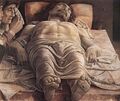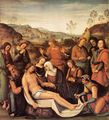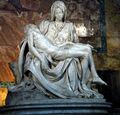Difference between revisions of "Category:Burial of Jesus (subject)"
| Line 51: | Line 51: | ||
File:Pieta Michelangelo.jpg|[[Pietà (1499 Michelangelo), art]] | File:Pieta Michelangelo.jpg|[[Pietà (1499 Michelangelo), art]] | ||
File:Entombment Raphael.jpg|[[Entombment of Christ (1507 Raphael), art]] | File:Entombment Raphael.jpg|[[Entombment of Christ (1507 Raphael), art]] | ||
File:Signorello.jpg|[[Lamentation over the Dead Christ (1502 Signorelli), art]] | File:Lamentation Signorello.jpg|[[Lamentation over the Dead Christ (1502 Signorelli), art]] | ||
File:Lamentation Sarto.jpg|[[Lamentation of Christ (1520 Andrea del Sarto), art]] | File:Lamentation Sarto.jpg|[[Lamentation of Christ (1520 Andrea del Sarto), art]] | ||
Body of the Dead Christ in the Tomb (1522 Holbein the Younger), art | Body of the Dead Christ in the Tomb (1522 Holbein the Younger), art | ||
Revision as of 17:13, 29 December 2013
- BACK TO THE EVENTS--INDEX
- BACK to JESUS OF NAZARETH -- JOSEPH OF ARIMATHEA -- MARY MAGDALENE -- NICODEMUS -- JOHN -- MARY OF NAZARETH
The Burial of Jesus refers to a series of events in the Passion of Jesus, following his Crucifixion. Such events are narrated in the Gospels of Mark (15:42-47), Matthew (27:57-66), Luke (23:50-56), and John (19:38-42); see also the Gospel of Peter (21-34).
Crucifixion of Jesus -> Burial of Jesus -> Resurrection of Jesus
Overview
All gospels agree that it was Joseph of Arimathea who took the initiative of giving Jesus a proper burial, asking permission to Pilate. The body of Jesus was wrapped in linen clothes and put in a new tomb in a nearby garden.
According to the Synoptics some women from Galilee (Luke), specifically Mary Magdalene and Mary of Joses (Mark and Matthew), were present. The Gospel of John does not mention the presence of women; it says that Joseph of Arimathea was assisted by Nicodemus. Contrary to what Christian tradition and iconography would later affirm, no ancient source records the presence of Mary of Nazareth and John.
The tomb provided by Joseph was a family tomb, a common typology in Second Temple Judaism. In family tombs corpses were laid down to decompose; the remains were than collected in ossuaries and located in the niches of the tomb chamber. The Gospels of Matthew, Luke and John emphasize that Jesus was deposed in "a new tomb in which no one had ever been laid" (Luke).
According to the Gospel of Matthew (and Peter) the tomb of Jesus was guarded by Roman soldiers--a detail that does not have much credibility from the historical point of view.
The Burial of Jesus in ancient sources
Gospel of Mark
Mark 15:42-47 (NRSV) -- [42] When evening had come, and since it was the day of Preparation, that is, the day before the sabbath, 43 Joseph of Arimathea, a respected member of the council, who was also himself waiting expectantly for the kingdom of God, went boldly to Pilate and asked for the body of Jesus. 44 Then Pilate wondered if he were already dead; and summoning the centurion, he asked him whether he had been dead for some time. 45 When he learned from the centurion that he was dead, he granted the body to Joseph. 46 Then Joseph bought a linen cloth, and taking down the body, wrapped it in the linen cloth, and laid it in a tomb that had been hewn out of the rock. He then rolled a stone against the door of the tomb. 47 Mary Magdalene and Mary the mother of Joses saw where the body was laid.
Gospel of Matthew
Matthew 27:57-66 (NRSV) -- [57] When it was evening, there came a rich man from Arimathea, named Joseph, who was also a disciple of Jesus. [58] He went to Pilate and asked for the body of Jesus; then Pilate ordered it to be given to him. [59] So Joseph took the body and wrapped it in a clean linen cloth [60] and laid it in his own new tomb, which he had hewn in the rock. He then rolled a great stone to the door of the tomb and went away. [61] Mary Magdalene and the other Mary were there, sitting opposite the tomb. [62] The next day, that is, after the day of Preparation, the chief priests and the Pharisees gathered before Pilate [63] and said, "Sir, we remember what that impostor said while he was still alive, 'After three days I will rise again.' [64] Therefore command the tomb to be made secure until the third day; otherwise his disciples may go and steal him away, and tell the people, 'He has been raised from the dead,' and the last deception would be worse than the first." [65] Pilate said to them, "You have a guard of soldiers; go, make it as secure as you can." [66] So they went with the guard and made the tomb secure by sealing the stone.
Gospel of Luke
Luke 23:50-56 (NRSV) -- 50 Now there was a good and righteous man named Joseph, who, though a member of the council, 51 had not agreed to their plan and action. He came from the Jewish town of Arimathea, and he was waiting expectantly for the kingdom of God. 52 This man went to Pilate and asked for the body of Jesus. 53 Then he took it down, wrapped it in a linen cloth, and laid it in a rock-hewn tomb where no one had ever been laid. 54 It was the day of Preparation, and the sabbath was beginning. 55 The women who had come with him from Galilee followed, and they saw the tomb and how his body was laid. 56 Then they returned, and prepared spices and ointments. On the sabbath they rested according to the commandment.
Gospel of John
John 19:38-42 (NRSV) -- [38] After these things, Joseph of Arimathea, who was a disciple of Jesus, though a secret one because of his fear of the Jews, asked Pilate to let him take away the body of Jesus. Pilate gave him permission; so he came and removed his body. 39 Nicodemus, who had at first come to Jesus by night, also came, bringing a mixture of myrrh and aloes, weighing about a hundred pounds. 40 They took the body of Jesus and wrapped it with the spices in linen cloths, according to the burial custom of the Jews. 41 Now there was a garden in the place where he was crucified, and in the garden there was a new tomb in which no one had ever been laid. 42 And so, because it was the Jewish day of Preparation, and the tomb was nearby, they laid Jesus there.
Gospel of Peter
Peter 21-34 (trans. Raymond E. Brown) -- [21] And they drew out the nails from the hands of the Lord and placed him on the earth; and all the earth was shaken, and a great fear came about. [22] Then the sun shone, and it was found to be the ninth hour. [23] And the Jews rejoiced and gave his body to Joseph that he might bury it, since he was one who had seen the many good things he did. [24] And having taken the Lord, he washed and tied him with a linen cloth and brought him into his own sepulcher, called the Garden of Joseph. [25] Then the Jews and the elders and the priests, having come to know how much wrong they had done themselves, began to beat themselves and say: 'Woe to our sins. The judgment has approached and the end of Jerusalem.' [26] But I with the companions was sorrowful; and having been wounded in spirit, we were in hiding, for we were sought after by them as wrongdoers and as wishing to set fire to the sanctuary. [27] In addition to all these things we were fasting; and we were sitting mourning and weeping night and day until the Sabbath. [28] But the scribes and Pharisees and elders, having gathered together with one another, having heard that all the people were murmuring and beating their breasts, saying that 'If at his death these very great signs happened, behold how just he was,' [29] feared (especially the elders) and came before Pilate, begging him and saying, [30] 'Give over soldiers to us in order that we may safeguard his burial place for three days, lest, having come, his disciples steal him, and the people accept that he is risen from the death, and they do us wrong.' [31] But Pilate gave over to them Petronius the centurion with soldiers to safeguard the sepulcher. And with these the elders and scribes came to the burial place. [32] And having rolled a large stone, all who were there, together with the centurion and the soldiers, placed it against the door of the burial place. [33] And they marked it with seven wax seals; and having pitched a tent there, they safeguarded it. [34] But early when the Sabbath was dawning, a crowd came from Jerusalem and the surrounding area in order that they might see the sealed tomb.
The Burial of Jesus, in the arts
In Christian iconography, the deposition and entombment of Jesus are collective scenes involving several characters--not only Joseph of Arimathea, Nicodemus, Mary Magdalene and occasionally, other women, but also Mary of Nazareth and John.
- Lamentation Signorello.jpg
- Lamentation Sarto.jpg
- Body of the Dead Christ in the Tomb (1522 Holbein the Younger), art
- Pietà (1523 Andrea del Sarto), art
- Deposition from the Cross (1525 Pontormo), art
- Deposition from the Cross (1528 Pontormo), art
- Deposition of Christ (1545 Bronzino), art
- Descent from the Cross (1560 Allori), art
- Entombment of Christ (1603 Caravaggio), art
- Angels Weeping over the Dead Christ (1618 Guercino), art
- Entombment of Christ (1656 Guercino), art
- La sepoltura di Cristo (1704 Predieri / Mazzoni), oratorio
- Morte e sepoltura di Cristo (1724 Caldara / Fozio), oratorio
- Entombment (1731 Czechowicz), art
- Dead Christ Lying in the Shroud (1753 Sanmartino), art
- Transport of Christ to the Sepulcher (1870 Ciseri), art
- 1 cont.
- Pietà (1876 Bouguereau), art
- Green Christ (1889 Gauguin), art
- Deposition (1895 Corinth), art
- Deposition (1906 Corinth), art
- Deposition of Jesus from the cross (1917 Beckmann), art
The Burial of Jesus in scholarship
- See Burial of Jesus (research) -- survey of scholarly works
Related categories
See also Jesus of Nazareth -- Tomb of Jesus
External links
Pages in category "Burial of Jesus (subject)"
The following 41 pages are in this category, out of 41 total.
1
- Lamentation of Christ (1306 Giotto), art
- Deposition from the Cross (1320 Master of Sant'Abbondio), art
- Entombment of Christ (1325 Giotto), art
- Pietà (1460 Tura), art
- Lamentation over the Dead Christ (1474 Tura), art
- Lamentation over the Dead Christ (1478 Mantegna), art
- Lamentation over the Dead Christ (1495 Perugino), art
- Lamentation over the Dead Christ (1497 Perugino), art
- Pietà (1499 Michelangelo), art
- Entombment of Christ (1507 Raphael), art
- Lamentation over the Dead Christ (1502 Signorelli), art
- Lamentation of Christ (1520 Andrea del Sarto), art
- Body of the Dead Christ in the Tomb (1522 Holbein the Younger), art
- Pietà (1523 Andrea del Sarto), art
- Deposition from the Cross (1525 Pontormo), art
- Deposition from the Cross (1528 Pontormo), art
- Deposition of Christ (1545 Bronzino), art
- Descent from the Cross (1560 Allori), art
- Lamentation (1593 Pulzone), art
- Descent from the Cross (1595 Carducci), art
- Entombment of Christ (1603 Caravaggio), art
- Angels Weeping over the Dead Christ (1618 Guercino), art
- Descent from the Cross (1634 Rembrandt), art
- Entombment of Christ (1656 Guercino), art
- La sepoltura di Cristo (1704 Predieri / Mazzoni), oratorio
- Morte e sepoltura di Cristo (1724 Caldara / Fozio), oratorio
- Entombment (1731 Czechowicz), art
- Dead Christ Lying in the Shroud (1753 Sanmartino), art
- Entombment of Christ (1850 Clésinger), art
- Pietà (1850 Clésinger), art
- Pietà (1868 Guérin), art
- Deposition (1874 Böcklin), art
- Pietà (1876 Bouguereau), art
- Transport of Christ to the Sepulcher (1883 Ciseri), art
- Green Christ (1889 Gauguin), art
- Deposition (1895 Corinth), art
- Deposition (1906 Corinth), art
- Deposition of Jesus from the cross (1917 Beckmann), art
Media in category "Burial of Jesus (subject)"
This category contains only the following file.
- 2007 * Jacobovici (arch-fi).jpg 328 × 499; 43 KB






